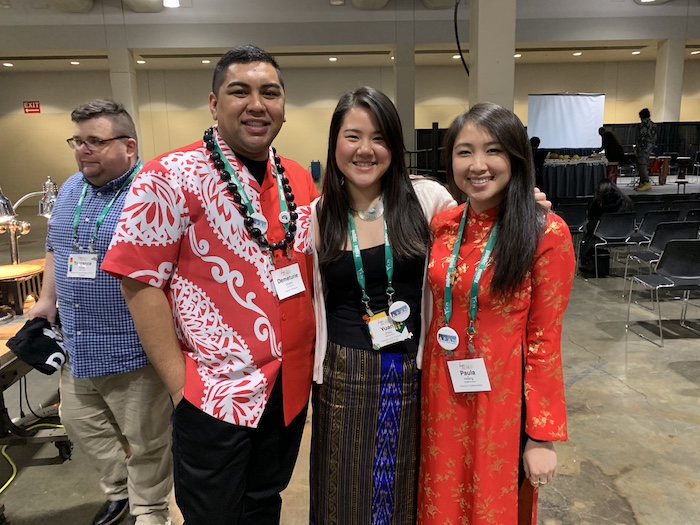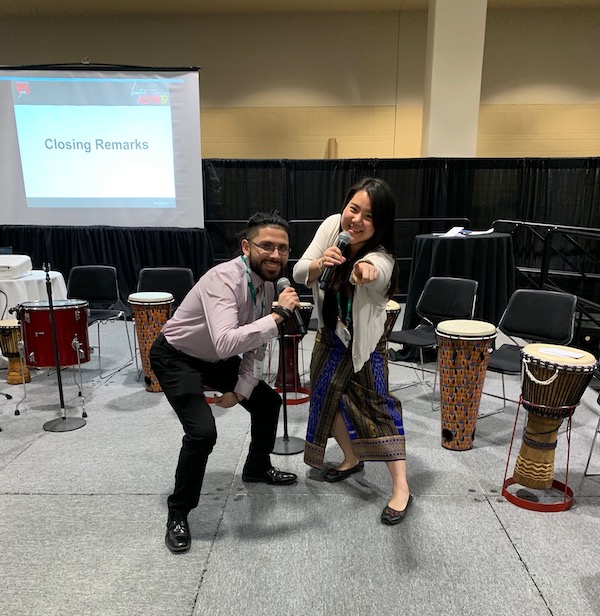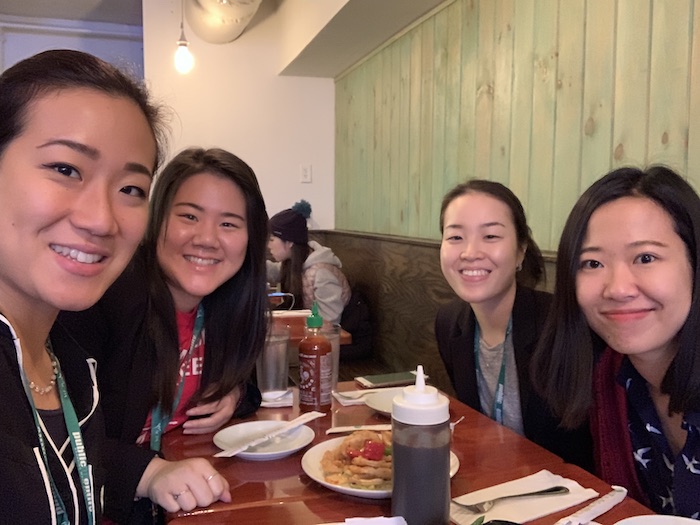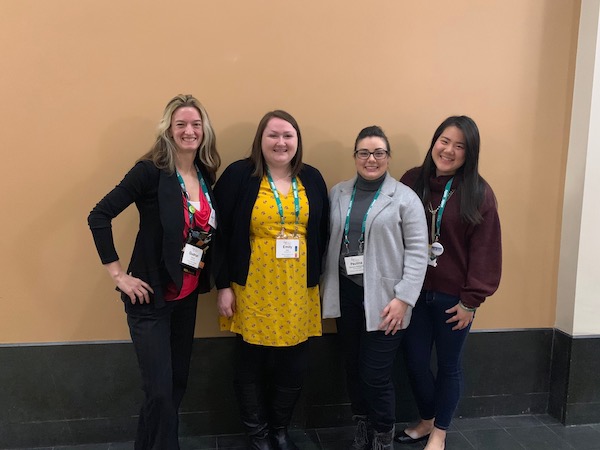Commission for Global Dimensions of Student Development
Monday, 18 March 2019 - 12:53pm
Even though this is my third ACPA, the excitement and conference-jittery are still there as I board my plane from San Francisco to Boston. In this blog post, I am happy to be sharing how I experienced ACPA this year.
This is the first year that I have attended a two-day pre-conference session. If you are able to, I would recommend registering for and adding a pre-conference to your ACPA experience because it is unlike anything you can get during the conference itself. Since it is a longer session, there is more room to connect with fellow session attendees, self-reflect, and dig deeper into difficult topics, together. We were able to discuss topics around race and Whiteness, the system of racial oppression, and many more. We practiced holding complex thoughts and teased out the places we “get stuck” with respect to racial justice equity issue by utilizing each other’s experiences and the expertise of our presenters. It is unbelievable how much we were able to unlearn, collectively agree and acknowledge the broken systems we all work in, and agree on a common goal we each want to contribute to. Mind you, this was a room full of strangers who work in different institutions and functional areas within student affairs. How much could be done with the people from the same office who you know and work with every day? A better question to ask is: Why isn’t this type of conversation happening?
Now, let’s switch gear to a dark exhibit hall with a well-lit stage in the front. I felt like there was a positive charge in the air that connects all of the student affairs professionals, from different institutions across the country and the globe, together as one. The Opening session (as well as the Closing session) always leave me feeling some type of way. The speech from Rev. Dr. Jamie Washington, the ACPA’s President, spoke urgency and inspired us to be “the leader we have been waiting for.” I felt like this is one of the learning objectives that the organization has set for all of its attendees. They hope that at the end of the convention, each of us will have gained information and feel rejuvenated enough so when we return to our respective institution, we can be the best that we know we can be. After the speech, I was exhilarated and felt like I can take on anything that comes my way. This would not be the best way to take on the convention. I was reminded by Elder Ramona “Nosapocket” Peters, from the Mashpee Wampanoag tribe, to stay grounded and reflective. Sometimes I can be caught up in the theories, and the urge to fix people that I forgot about the things that allow me to be me: the earth that I stand upon, the air that I breathe, and the sun that gives me life and joy. Elder Ramona shared with us a time when the Mashpee Wampanoag tribe took in strangers from another land, showed them hospitality as the host, and shared their food with these strangers. These strangers are the Pilgrims, the guests who turned around and took away the lands from the Native Americans. Fast forward to today, Elder Ramona is on stage sharing the stories of her people to the people who have taken away her land. This takes courage and resiliency beyond imaginable. These are stories that have been left out of the history textbooks and out of our minds for centuries. As we sat there, not having done enough for her and her people, Elder Ramona showed kindness and love to everyone in the room. She is generous and is willing to share with us the sorrow and resiliency of her people, an important lesson for all of us to embrace. Every time the land acknowledgment statement is shown throughout the rest of the conference, I am reminded of Elder Ramona and the stories of the Mashpee Wampanoag tribe. This is not just a bunch of texts we read off at the beginning of each session. To me, it is a reminder that we have not done anything for the wrong that was done to the people of this land. To me, it is a reminder that we need to continue asking ourselves, what can be done beyond putting up this statement on a PowerPoint and what should we, as individual and as an organization, be doing in the future years of ACPA? *pause, take a deep breath in and out*

After the Opening session, ACPA19 officially began and our evenings were packed with various events. Since I am on the directorate boards for both the Coalition of Asian Pacific American Network (APAN) and the Commission for Global Dimensions of Student Development (CGDSD), my evenings were pretty busy working the CelebrACPA and CultureFest events. CelebrACPA is like a resource fair where folx can learn about all of the amazing entities that make up ACPA such as the different coalitions (represent who we are), commissions (represent what we do), ACPA regional chapters, and more. With this lively atmosphere, we transitioned into #CultureFest2019 where I got the opportunity to co-host on stage. One of the main purposes of CultureFest is for folx to interact with the coalitions in a more intimate environment. We also brought in various new and old local performers to the event.

For the next two days (I left early on Tuesday), my conference experience can be categorized into three categories: meeting with (new/old) friends, business meetings, and educational sessions. I recommended folx to find a couple of “meal buddies” at the convention. Meal buddies are basically folx you want to grab breakfast/lunch/dinner with. By doing so, you are allotting time to take care of your body while spending quality time with new/old friends. Killing two birds with one stone! This trip has been so much more valuable because of the people I get to connect and reconnect with from grad school friend (S/O to Yewineshet Geberegeorgis), fellow Kpop lover (S/O to Kelly Smemo whom I first met as a fellow volunteer), my #InternationalSApro squad (S/O to Yuezhong Zheng, Bianca Chau, and Konoka Shiino), and a high school friend who I haven’t met in 7 years (she lives in the city). The conversation with each person differs, yet they are all important to who I am. No two people are the same and this is the thing about ACPA that I appreciate. It provides you with the space (literally, the Convention) and the opportunities to connect with one person, at the least, who share a common interest as you, whether that’s student affairs-related or life-related.

There are two types of business meetings, open and close. If you are not on a directorate board for a coalition/commission (yet), the open meetings are the ones that you can attend. Open meetings are great opportunities for folx to learn more about the groups that have caught your eyes at the events on the Opening night. I got involved with APAN and CGDSD right after #ACPA17, which is my first convention experience. Since then, my convention experience has been much more fun and meaningful. Folx in these communities are my professional family members who affirmed and encouraged, not just my #SApro identity, but also my personal identities. Through involvements with these two organizations, I also had the honor to present with some of my amazing colleagues from across the country. Thank you 60 some folx who attended our session. If you missed it, don’t worry! Be on the lookout for our webinar!

To summarize the long story, the ACPA Convention makes me happy. Did I feel tired? Of course! I tried to grab every opportunity I could to stay involved and to catch up with folx who I haven’t seen since the last convention. However, I was willing to do it because I know how much this all means to me, professionally and personally. I left the conference looking forward to the next year and, more importantly, to the work that I will be doing with my folx from now until #ACPA20.
Bio of Yuan Zhou:Originally born and raised in Bangkok, Thailand, with a strong Chinese family background, Yuan Zhou came to the U.S. 9 years ago as a high school exchange student. Last year, she completed her graduate degree, M.S.E in Higher Education Administrations, from the University of Dayton in Ohio (Go Flyers!). Yuan Zhou is currently a Residence Director at the University of San Francisco. In her role, she manages continuing students’ residential areas with a global-focused community and support a large number of international students coming to campus. As an individual who considered herself as a beautiful blend of three cultures, Yuan has a passion for how various experiences and understanding of cultures can impact the development of individual’s cultural identity (ask her about her Master’s thesis!). Follow her professional journey on social media using the #YuanthePRO.

